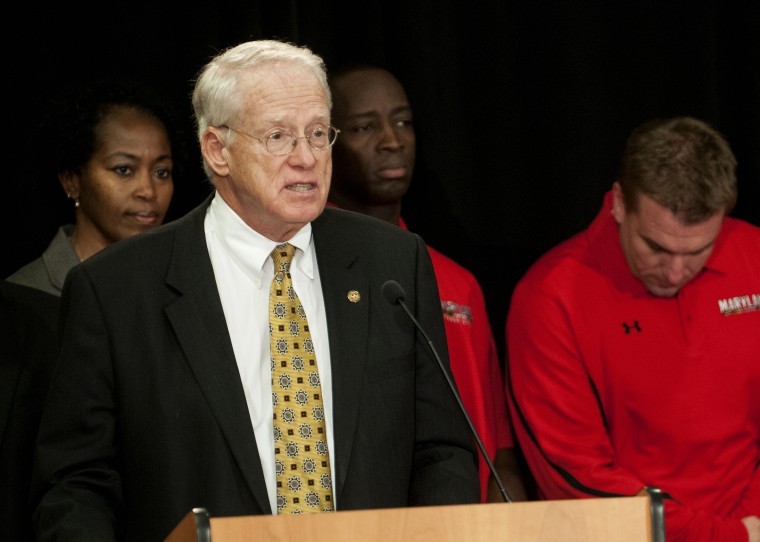
Chancellor Brit Kirwan
Nearly four months after the university announced its move from the ACC to the Big Ten, a state board found the Board of Regents violated open meetings laws when it met twice in November to discuss the move.
The Maryland Open Meetings Compliance Board announced Tuesday that the Board of Regents — a 17-member ruling body that oversees the University System of Maryland — violated the Open Meetings Act “in multiple respects” when it held a conference call Nov. 18 and met in Baltimore Nov. 19. The meetings came just a couple days after university President Wallace Loh and Big Ten officials developed a contract proposal.
While parts of the meeting could have been held behind closed doors justifiably, the compliance board states, the regents “did not identify those exceptions at the time.” Additionally, the board ruled the regents did not keep proper minutes of the closed session or provide an adequate public summary of the meetings.
Two people filed separate complaints against the regents: former political science teacher Ralph Jaffe and journalist Craig O’Donnell.
“This is typical of what goes on in the state government — secret meetings, manipulating the people,” Jaffe said. “The fact that students at UMD were not made known of this meeting is an absolute disgrace.”
Loh’s Nov. 19 announcement that the university would be switching conferences after helping form the ACC about 60 years ago led to much public outcry. Many initially chastised the move and said the public should have had more input before Loh made his decision. However, the decision ultimately rested with Loh. He said he wanted the regents’ approval, though, and would have torn up the contracts if he did not receive it.
The regents first learned of the potential deal between the university and the Big Ten on Nov. 15, according to the compliance board’s report. The regents’ legal counsel, Assistant Attorney General Thomas Faulk, advised them and said a closed meeting met the Open Meetings Act’s exceptions and was still in compliance with state law.
Faulk asked the compliance board to drop the complaints because the regents “endorsed a decision already made,” rather than voting to make a decision.
Upon receiving criticism for the closed session meetings, the university system issued a statement in December, acknowledging it did not completely fulfill its duty to the public but noting that matters discussed warranted a private meeting. A month later, the regents said the failure to announce the meetings was “at worst technical” and the public learned of the sessions through the media.
But the compliance board dismissed the regents’ argument, stating that only official notice satisfies the open meetings law requirements.
And though the compliance board determined the regents were warranted in holding parts of the meeting privately — such as discussing financial documents Loh disclosed to the regents concerning the move — other parts could and should have been open to the public. For example, possible uses of additional revenue the university will make by being in the Big Ten and how the move will affect students’ athletic and academic careers should have been public discussion, the compliance board stated.
Jaffe hopes the regents will now hold a public meeting where all affected parties can vote on the move.
Some critics of the regents’ decision said officials should address the matters in a public forum and revote on the move.
“Not only did they violate the process, a flawed process, but it was also a bad decision,” Jaffe said. “Now they’re going into this Big Ten conference, nowhere near most of the schools. It’s a terrible decision, philosophically and morally and also legally because they broke the law.”
Although USM officials said they are aware of the public’s sentiment, they said not to expect a public vote — at least just yet.
“It hasn’t been on the agenda for any public meetings at this point,” said Mike Lurie, USM spokesman. “I’m not aware of a meeting scheduled for that to happen. That doesn’t mean that that would or would not happen.”
The regents have since outlined and revised procedures for future closed session meetings, Lurie said, which the compliance board determined is consistent with state law. The regents will “redouble [their] efforts” to provide advanced notice of any closed meeting, including its date, time and location; vote before going into closed session; and prepare proper minutes of closed sessions.
But Jaffe said the state’s Open Meetings Act still needs revision.
“The current one has too many loopholes,” Jaffe said. “All state government agencies should have their meetings open to the public because they’re conducting the public’s business, and when they conduct the public’s business, the public has a right to know what’s going on, which is exactly what did not occur with the Board of Regents.”
newsumdbk@gmail.com



